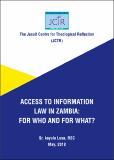Access to Information Law in Zambia: For Who and for What?
Abstract
Since the coming of the Patriotic Front (PF) party into power, there has been great public expectation about the enactment of the Access to Information law. This public expectation arose from the fact that it was one of the party’s campaign promises while in opposition. After winning the September 2011 general elections, which ushered the party into government, the PF continued
with this promise. In 2012, the PF-led government established a Taskforce on ATI with a remit to draft the Bill. This increased hope among the public that the government would deliver on that score. In June 2012, the government produced a draft ATI Bill,
which raised more public expectation that the law would finally be enacted by the end of that year. Disappointingly, it has now
been seven years of PF rule and there have been no further significant signs of commitment to this particular campaign promise. This booklet therefore serves as an educational tool on the right to access information. It is also aimed at reminding different stakeholders of their duty to demand the ATI law. The booklet furthermore takes stock of efforts made in this regard, challenges experienced and the steps different stakeholders need to take, which include government and the general citizenry
Description
To access information is both a human right and a social need. It is a necessity particularly in a democracy where every citizen has a role to play in the governance of the country. It promotes transparency and accountability; it helps in the fight against corruption and generally leads to open governments and to effective democratic participation by the public. Government has an
obligation to make access to information possible as a duty-bearer, while the public in entitled to demand that their right is fulfilled. When there is no legal channel to do so, the challenge of enjoying this right is greatly increased. Thus, the duty-bearer and the rights-holders have a responsibility to play their part in ensuring the enjoyment of access to information. Concerted
efforts from the wider civil society and the public that can ensure there is an ATI law in Zambia, just as there are in several African countries. Thus, the ATI Bill must become a reality in Zambia.
